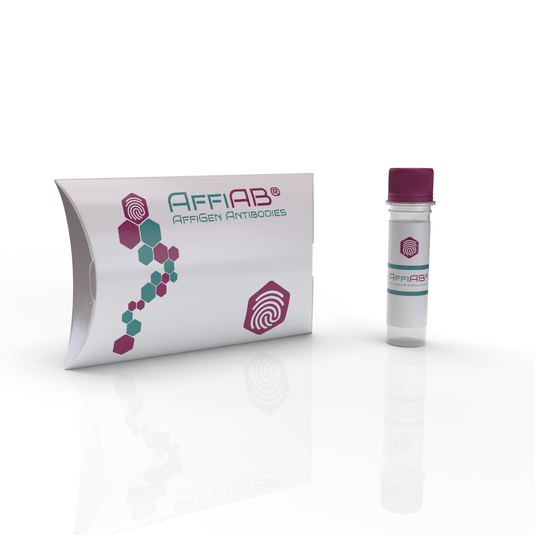AffiAB® Goat anti-GFP Polyclonal IgG Antibody
AffiAB® Goat anti-GFP Polyclonal IgG Antibody is a reliable choice for research applications requiring the detection of green fluorescent protein (GFP). This antibody binds to GFP with high specificity and can be used for immunoblotting and immunohistochemistry.
Host: Goat
Species: N/A
Description:
AffiAB® Goat anti-GFP Polyclonal IgG Antibody is a high-quality research-grade antibody that specifically recognizes the green fluorescent protein (GFP). GFP is a widely used protein for visualizing and tracking protein expression in cells and tissues, and this antibody is commonly used in a variety of research applications, such as fluorescence microscopy, flow cytometry, and western blotting. This polyclonal antibody is generated in goats and has been affinity-purified to ensure high specificity and low background binding. The antibody is available conjugated to a range of fluorophores, including DyLight405, DyLight488, and DyLight633, allowing for flexibility in experimental design. AffiAB® Goat anti-GFP Polyclonal IgG Antibody is a reliable and versatile tool for researchers studying protein expression and localization in various model systems.
Gene Identifier/Accession Number: N/A
Form: N/A
Concentration: 2 mg/mL
Type: Primary
Clonality: Polyclonal
Isotype: IgG
Conjugation: Unconjugated
Application: Western Blot, Immunofluorescence, Immunohistochemistry PARAFFIN PROTOCOL , Immunohistochemistry FROZEN
Storage: For continuous use, store at 2-8 C for one-two days. For extended storage, store in -20 C freezer. Working dilution samples should be discarded if not used within 12 hours.
Special instructions: The antibody solution should be gently mixed before use.
Goat anti-GFP Polyclonal IgG Antibody
In the field of molecular biology and bioimaging, the Goat Anti-GFP Polyclonal IgG Antibody has become an indispensable tool. Green Fluorescent Protein (GFP), originally derived from the jellyfish Aequorea victoria, is widely used as a fluorescent marker in various biological studies. The ability of this antibody to specifically bind to GFP has significant implications for research in cell biology, developmental biology, and neuroscience.
Understanding Goat Anti-GFP Polyclonal IgG Antibody
Production and Specificity:
The Goat Anti-GFP Polyclonal IgG Antibody is produced by immunizing goats with GFP or a GFP-derived peptide. The resulting antibody recognizes multiple epitopes on the GFP molecule, providing high sensitivity and specificity. This polyclonal nature is advantageous for detecting GFP in various experimental conditions.
Benefits of Goat-Derived Antibodies:
Goat-derived antibodies offer high antigen sensitivity and substantial yields, making them suitable for producing antibodies against widely used markers like GFP. Their broad immune response is particularly effective for producing antibodies with strong and consistent affinity.
Applications in Scientific Research
1. Fluorescent Tagging and Imaging:
The primary application of this antibody is in fluorescent tagging and imaging. It allows researchers to track GFP-tagged proteins, study protein-protein interactions, and visualize cellular processes in real-time.
2. Developmental Biology:
In developmental biology, the antibody is used to trace the expression and localization of GFP-tagged proteins during organism development, providing insights into developmental mechanisms.
3. Neuroscience Research:
In neuroscience, the antibody aids in visualizing neural connections and brain activity patterns by targeting GFP-expressing neurons, facilitating the study of neural networks and brain functions.
4. Immunoprecipitation and Western Blotting:
For biochemical analysis, the Goat Anti-GFP Polyclonal IgG Antibody is crucial in immunoprecipitation and Western blotting. It enables the isolation and detection of GFP-tagged proteins from complex biological mixtures.
5. Immunohistochemistry (IHC) and Immunocytochemistry (ICC):
In IHC and ICC, this antibody helps in detecting GFP expression in tissue sections and cultured cells, elucidating the role and distribution of GFP-tagged proteins within various tissues.
Conclusion
The Goat Anti-GFP Polyclonal IgG Antibody is a vital tool in the exploration of cellular and molecular processes. Its specificity to GFP and the broad reactivity provided by its polyclonal nature make it invaluable for a wide range of applications in biological research. As GFP continues to be a fundamental tool in scientific studies, this antibody will undoubtedly remain central to future discoveries and innovations.

